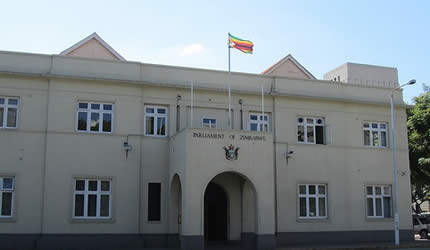Constitutional vacuum on returned Bills

 Zvamaida Murwira Senior Reporter
Zvamaida Murwira Senior Reporter
There is no constitutional provision giving Parliament a time-frame to dispose Bills returned by the President for reconsideration, an official has said. Assistant Clerk of Parliament Mr Johannes Gandiwa said the Constitution was silent on how long Parliament should consider and resubmit to the President Bills the Head of State and Government declined to sign for a variety of reasons.
Mr Gandiwa said this at the weekend at a workshop on parliamentary reporting, organised by Misa-Zimbabwe in Gweru.
Journalists had asked why the Income Tax Bill, which President Mugabe expressed reservations about, was still with legislators.
“. . . if it is returned, the Bill is referred to the committee stage of the National Assembly and should be passed by two-thirds of the total number of the National Assembly,” Mr Gandiwa said.
He said it was important to note that it is not two-thirds of total members present but those that constitute the National Assembly.
Section 131(7) of the Constitution says: “When a Bill has been referred back to Parliament in terms of Subsection (6)(b) the Speaker must without delay convene a sitting of the National Assembly which must (a) reconsider the Bill fully and accommodate the President’s reservations or (b) pass the Bill with or without amendments by a two-thirds majority of the total membership of the National Assembly and in either case the Speaker must cause the Bill to be presented to the President without delay for assent and signature and must give public notice of the date on which the Bill was sent to the President.”
President Mugabe did not assent to the Income Tax Bill, which sought to widen the tax base.
Other stakeholders also expressed reservations on the Bill that was steered by former finance minister Tendai Biti.
President Mugabe was uncomfortable with the proposed shift from source-based to residence-based taxation.
Another sticking point was the impact of limiting allowable expenditure for business and taxation of insurance and pension.
The President also expressed reservations on the repeal of capital gains tax and taxation on capital amounts.
The apparent softening of the penalty regime was another sore issue.
Other problems with the Bill were resource taxation — particularly related to the mining sector — and administrative processes and procedures.
Stakeholders said the Bill was structured in a manner that would see virtually everything being taxed, including gifts.
One of the contentious issues was a clause to levy funds remitted to Zimbabwe from the diaspora. Further, Mr Biti wanted all Zimbabweans to be taxed regardless of where in the world they made their income.








Comments